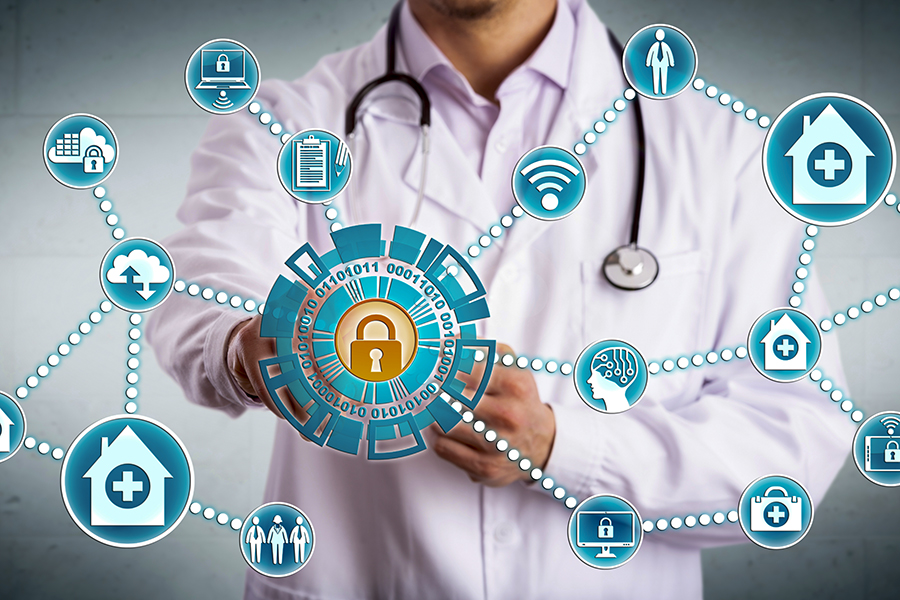
Cyber security for telehealth services
Telehealth is a boon for providers and patients. It increases the availability of care while reducing costs. However, telehealth platforms do have intrinsic privacy to protect sensitive patient data, many consumers are eager to adapt to this health delivery method, but many platforms lack adequate data safeguards
 Healthcare organizations working with patients and their confidential records must follow policies, procedures, and laws designed to protect patients privacy and confidentiality
Healthcare organizations working with patients and their confidential records must follow policies, procedures, and laws designed to protect patients privacy and confidentialityImage: Shutterstock
What is cybersecurity?
Technically, cybersecurity is a body of technologies, practices designed to protect networks, computer systems, and data from attack or unauthorized access, or misuse of authorized assets. The goal of cybersecurity is to reduce the risk of cyber-attacks and to protect organizations and individuals from intentional and deliberate exploitation of security vulnerabilities in systems, networks, and technologies. You are done with teleconsultation on Practo and now you are about to checkout and you are offered cash withdrawal options with your debit or credit card or UPI, and like you, there are millions of users who are sharing such sensitive information on the platform, have you ever wondered how secured the information on practo is? From updated privacy policies to security-focused patents to use AI for Data Security each company increases its focus on data protection to promote user trust. With the increasing growth in the digital world, cybersecurity threats will continue to intensify as hackers learn to adapt to security strategies. This will increase the overall need for cybersecurity by companies that will be paying more and more highly qualified security professionals to protect their vulnerable assets from cyber-attacks.
Growth of Telehealth Consultancy:
Telehealth means you no more have to travel, your appointment with the physicians takes place through a TV screen in between you. Healthcare providers can see between 50 and 175 times more patients via telehealth than ever before, the main reason being telehealth platforms offers a wide range of array for different healthcare issues, approximately 20 percent of emergency room visits and 24 percent of routine visits and outpatient volume could be delivered virtually with the help of telehealth.
How can Telehealth services prevent themselves from cyber-attacks?
Telehealth is a boon for providers and patients. It increases the availability of care while reducing costs. However, telehealth platforms do have intrinsic privacy to protect sensitive patient data, many consumers are eager to adapt to this health delivery method, but many platforms lack adequate data safeguards. The same platform that makes telehealth possible also creates threats to patients, protecting Patient Health Information (PHI) is most important. Few steps to be taken for privacy concern are as follows:
- Using a VPN for telehealth services and for general device usage.
- Verifying HIPAA Compliance to protect Patient Health Information (PHI)
- Authenticating and authorizing both play an important role in security systems to ensure endpoints are secure.
- Improving telehealth platform safety measures by integrating encryption and other safeguards into their interaction with patients.
- Educating patients about the telehealth security threats allowing them to update their application and operating system frequently and restricting app permission to what is necessary for app functionality.
Why is the Telehealth and Healthcare sector a new hotspot for Cyber-Attackers?
Entry points to a larger attack: Imagine if the significant criminal organization has access to modern hospitals the criminal organization can seize or shut down a large hospital or a group of hospitals across the city, state, or country. If this type of cyber-attack occurs the enemy can compromise national security without causing a physical war.
Financial gain: For cybercriminals, the health record with the private and personal information are attractive and highly valued information. The healthcare providers typically pay ransomware attackers even if they can recover those sensitive patients' records from their backup systems because they must put life to death urgency with the highest priority.
Easy target: Due to high vulnerability, the healthcare industry lacks when it comes to cybersecurity digital literacy among personnel and there are insufficient regulators and enforcement and outdated software making them an easy target for example 83% of medical image devices run on unsupported operating systems, many medical devices such as ventilators or robotic surgical equipment are now connected to the internet of things more IoT device means more attack surface for hackers.
For Telehealth security leadership, what architecture should they consider?
Zero trust security approach: It is the security concept that enterprise businesses should not automatically trust any information either from inside or outside of their organization. All business sectors should verify the credentials of everything that tries to connect to their system before granting access.
Network ring: It is a configuration in which device connections create a circular path, where packets of data travel from one device to another device until they reach their intended destination. Network ring limits the damage hackers can do if they can get into the network as they will be trapped within that ring.
The size of the global healthcare market was estimated at USD 8.2 billion in 2018 and is expected to achieve a 19.1% CAGR from 2019 to 2025. Teledoc health which is a virtual healthcare company based in the USA manages all data and is stored in an encrypted format that exceeds standards defined by Health Insurance Portability and Accountability Act (HIPAA). All data transfers are performed using the same standards that meet or exceed HIPAA, and no data is transferred to users who do not have the keys to access certain data, patients and providers must rely on telehealth systems to keep personal information confidential and secure, This means that healthcare organizations working with patients and their confidential records must follow policies, procedures, and laws designed to protect patients privacy and confidentiality, and must take adequate steps to protect telehealth devices and software.
The article has been contributed by Akshay Aparadh who is currently pursuing PGDM in Healthcare Management from S.P. Mandali’s Prin. L. N. Welingkar Institute of Management Development and Research (WeSchool), Mumbai.
[This article has been reproduced with permission from Welingkar Institute of Management Development and Research (WeSchool)]
Post Your Comment

















